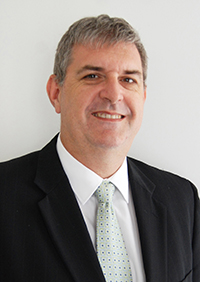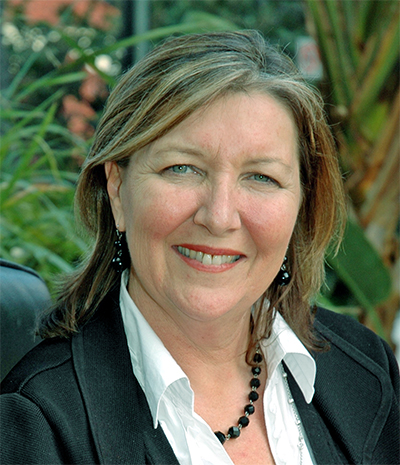Has Queensland Leaders created the world's best business development platform?
ENTREPRENEURIAL in its own right, Queensland Leaders – which has since developed into International Leaders – is a catalyst for supporting entrepreneurs and their companies on some astonishingly successful journeys. There is no other network and support structure like it anywhere in the world – so it makes perfect sense for Leaders to lead on into new markets including the UK, US, Hong Kong, Canada and New Zealand.
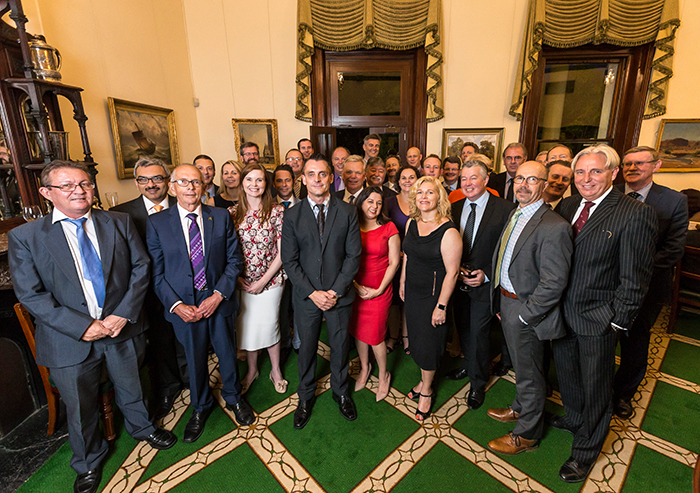
IT STARTED in 2006 as Queensland Leaders – an organisation built to help build others – and 10 years later it has been so successful that its methodology and business acumen is now in demand nationally and internationally.
On results so far, Queensland Leaders – now headlined by its International Leaders brand – may be the most successful business knowledge network, for companies seeking to accelerate growth, in the world today.
Such success has energised and equipped other leading Queensland-based businesses – like Jamie Pherous’s travel industry acquisition and growth group Corporate Travel Management and Karen Stanton’s innovative materials manufacturing group, Heat Treatment – for solid and rapid expansion.
Importantly, Leaders has also kept them, and business leaders like them, engaged long term to encourage and assist other business owners and leaders making similar journeys.
“You can sum it up as the Leaders groups providing knowledge, networks and capital,” Queensland Leaders and International Leaders executive director and founder James Paulsen said. “But what this movement has become is far, far more than that. 
“You could say that we are an organisation that walks the talk … we put into practice what we know and what we learn – and adapt fast. We constantly learn from our networks, partners and industry experts and we are always willing and able to pass what we are learning and experiencing on to our network.
“In fact, each of our Leaders groups has its own character and varies because of the people involved and their own experiences.
“Anyone who has made a success of their journey in business will tell you that it is not about them – it is about the people who journey with you, how you all adapt to challenges and problems and, yes, even how you handle success so that you remain grounded.”
Remaining grounded, but never being afraid to reach higher, is in James Paulsen’s business DNA.
“It is the evolution of the business … and when you are moving this quick, you have got to be continually learning,” he said. “It’s about having good people around you.
“Something from left field can completely undo the best of plans and the best of hard work. And you have got no say in it. It’s an excellent warning system.”
Learn from others and pass it on seems to be something of a mantra for those involved with the Leaders.
“To me, the success of the Leaders is all down to this unique environment we have been able to create, in which highly successful business leaders are willing to help others, often in unique ways and usually for no material gain, so others can develop their businesses to reach their unique potential,” Mr Paulsen said.
Helping other business leaders through to success is “addictive” according to Mr Paulsen.
“There are many, many reasons, some professional and some personal. Basically, it is empowering company founders,” Mr Paulsen said.
“Historically, business owners or management were restricted by resources – particularly cash and time.
“If you can bring those resources to the table efficiently – such as knowledge and connections – you have a far greater chance of navigating to success.
“Businesses keep talking about what they want to do but they never get around to it. I think Leaders, we have discovered, becomes that ecosystem that becomes that catalyst for change.”
COMMUNICATION KEY
A GOOD EXAMPLE of how it works is how Mr Paulsen and the International Leaders team make it work for themselves – most recently in developing a communication program.
“We have just gone through a communications program and we have gotten to know ourselves a hell of a lot better than what we did six months ago,” Mr Paulsen said. Although internally run, the program had input from key people in the Leaders network.
“We had feedback from the licensees saying, we are discovering that we are more to the clients
than what we think we are,” Mr Paulsen said. “We are lifelong relationships, we are protectors, we are moral support, we inspire these people. 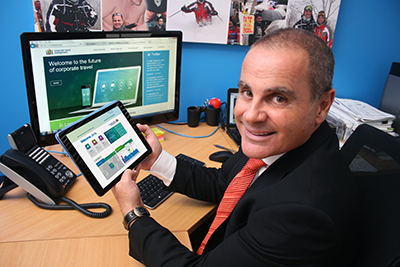
“We started collecting all that information from all the licensees, and started questioning, well, what does that mean?
“One of the things we did, particularly with going into the UK and the US is we had to source feedback. We have got heaps of members’ feedback but we didn’t (at that stage) have feedback from the Experts or the Advisory Board or the Licensees.”
So they went out and collected that rare feedback, with astonishing results.
“That just blew me over,” Mr Paulsen said. “The likes of (former Queensland Treasurer and chairman of Macarthur Coal) Keith De Lacy and (former Brisbane Lord Mayor) Sallyanne Atkinson, and interstate like (NSW Leaders advisory board member) Tim Rossi, who is one of the founders of Hill and Samuel which became Macquarie Bank – these people are inspired by their involvement.
“We have created a new market. We have created a new ecosystem that is bigger than any one, but it’s completely evolved.”
RULE TO SERVE
STAYING grounded is a Leaders method as well as a mantra.
“The most important factor – and particularly when we are looking at picking CEOs for the US and the UK – is culture,” Mr Paulsen said.
“We have a No Dickhead rule.
“I’m not the first one to say that, but it’s so true. It’s a big rule.
“Once you get that sort of self-serving thinking or process in an organisation it is like a cancer. So, for us, we only want the people who understand the process of give, and receive later. Not, take and run.”
The supporters who have stayed with Queensland Leaders are clearly of like mind. 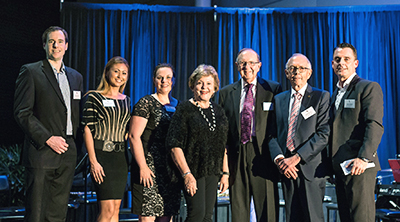
“The ones that are still with us, on the Experts, which is the vast majority – absolutely,” Mr Paulsen said.
“They don’t see their involvement as a return on investment. Primarily they see their involvement as ‘giving back’ and contributing to the economic development within the state.
“But, by nature of the engagement, it does create a commercial return. But – that’s not the driver. This return has enabled us to invest into building a national and international network of Leaders ecosystems."
Over time, the wisdom of this approach has been self-evident.
“We have had (large) organisations, particularly at the Partner level, that we approached eight, nine, 10 years ago who were just ‘too cool for school’ for this and they did not see the value in it,” Mr Paulsen said.
“They are all gone. And these were big listed companies.
“But then you look at someone like Adrian Di Marco (TechnologyOne founder), or Peter Birtles (Super Retail Group managing director and CEO) or Martin Ward (AP Eagers managing director and CEO) … these guys, they look beyond the profit and loss and they see the economic benefits that this sort of network can bring,” Mr Paulsen said.
“It is almost a spiritual thing. They just see the world beyond the necessities of what they need to achieve to be successful. They see the broader opportunity. I think it epitomises the whole philosophy behind Leaders.
“I know a lot of our Experts, over time, some got it quickly and others it took a year or two of hammering in: Guys, look at the big picture.”
AND THE BIG PICTURE IS …
THE LEADERS groups are a shared vision, and a shared creation, bringing powerful skills, experience and knowledge to bear.
“I think, about the broader network, it is about the culture, having the right people,” Mr Paulsen said.
And, as a group, we are constantly evolving off the learnings from each other.
“That’s why after 10 years we just go from strength to strength. The secret …? I probably realised this earlier this year …
“I looked at our business traditionally as a professional service business, and we are not. We are a professional service platform.
“We were probably one of Australia’s first platform businesses 10 years ago without even realising it. We don’t offer a service, per se. We don’t offer advice. We don’t have our own key professionals internally.
“We are the platform that brings together all the relevant parties and creates the atmosphere, and the rules of engagement, to allow outcomes to be achieved. I think that’s the big difference.”
The various Leaders groups quickly evolved to embrace the personalities and networks of the licensees, and those changes filtered back.
Robert Ford, a former state manager of BankWest and with an extensive and versatile banking experience, was the first as he launched Victorian Leaders three years ago. Victoria’s third series started in October.
A year later, Dan Liszka gathered a team to found NSW Leaders. He has in recent years been a business coach and involved in small cap raising for SMEs. He has long been active in assisting start-up and fast growth businesses developing out of Sydney.
“Robert Ford is a bull at a gate,” Mr Paulsen laughed. “He and (former Australian Cricket coach, now a business mentor and coach) John Buchanan were instrumental in getting South Australia up.
“South Australia was never really on my radar because of my previous experience. But they persisted with it and they found fantastic CEOs and South Australia is probably one of the strongest programs now – after four months – because the market had been looking for something for many years and we had the right people who could bring together the key players.”
South Australia has had a great start because of one of its key directors, Natasha Malani who Mr Paulsen described as a regional ‘force of nature’.
“She is a serving council member of Adelaide City Council (previously Deputy Lord Mayor) and she is also a director of SA Leaders. She is one driving the success in South Australia.”
The new faces have also brought new skills and opportunities for programs that supplement and complement the Leaders series. So far, these include the Future Leaders and Sports Transition series, as well as the unique Leaders Investment Centre Platform that is part of the Leaders technological platform.
SPORTS TRANSITION SERIES
THE SPORTS Transition Series came about through the experience of John Buchanan and Robert Ford, both seeing a need to help foster post-sport business careers for leading sports people.
“That is still evolving,” Mr Paulsen said. “We’ve had a couple come through Queensland. We have Port Adelaide in SA. Rob is about to get Essendon. John Buchanan is still banging the drum.
“Sport, we found, had a unique peculiarity to it that a lot of the players have been managed their whole lives and quite often have had difficulty in making a decision (on joining the program),” Mr Paulsen said. “If somebody is still being managed … if something is not at the benefit of the manager, they are unlikely to endorse it.
“Long term, Sport Transition is definitely a Series that we want to develop,” Mr Paulsen said. “We run it in conjunction with Future Leaders. So it allows these sports people to engage with other business founders at a peer level.”
FUTURE LEADERS
AS SUCCESSFUL launches go, the group’s Future Leaders program has been a stand-out. It has attracted some of the most innovative fast-growth early-stage businesses in Queensland, many transitioning to a full Leaders program, and other states are rapidly following suit.
“Future Leaders is going well,” Mr Paulsen said. “We have launched in Brisbane, Sydney, Melbourne – and Adelaide and Perth will launch later on this year. New Zealand later on this year as well.
“So the Executive Leaders Series is the core, and that has been going strong everywhere. Future Leaders is the second stage which comes in and it has been going in Queensland for about four years. All the states typically incorporate it within a year of operation.
“It’s not for everyone … the reality is that some people are going to go on and do great things and other people are really happy operating at a comfortable level and that’s where the future leaders provides an ongoing support to them,” he said.
“Those companies that get that initial empowerment and engagement through Leaders, suddenly the world opens up – and they can’t get enough. We had a Future Leader company in the building industry raise $10 million investment last year as a direct result of engagement.
“It’s a bit like Jamie Pherous (Corporate Travel Management executive director). CTM is going well … yeah, 18 bucks a share …”
CTM listed in 2010, supported by Queensland Leaders Industry Expert partner Morgans, who continue as the company’s lead advisors, at $1 a share.
“One of the other things I think that probably underpins why the Leaders model has been so successful is that the level of continual change affecting every company is requiring every business to innovate –
and to successfully innovate, you need to collaborate – and that whole process requires a fixed journey,” Mr Paulsen said.
“That really is the essence of the Leaders model. Change drives innovation, innovation drives collaboration and collaboration requires a journey.
“Like with any successful business – I guess I’ve got the luxury of having the fortitude now that I can work on the business – and I’m lucky I’ve got Stephen (Beirne) and Melissa (Stubley) and Malowina (Carlton) and others who can make sure the foundations continue to click along.”
PLATFORMS ON SOLID GROUND
THE TECHNOLOGY International Leaders employs is as practical as it can get. The suite is broken into three key service areas: the Leaders Resource Centre, the Leaders Licensee Centre and the Investment Centre.
“The Leaders Resource Centre operates as an ecosystem and a village centre for each of the Series, and that is where all the intellectual property is collected and maintained,” Mr Paulsen said. “All the videos, the presentations, the productions, the feedbacks, the report – so all the IP.
“Look, that’s a pretty simple system. It is a bit like YouTube, Facebook, Dropbox, Linkedin … we don’t want to over-engineer it. We have a good understanding of the engagement piece – companies look for what they want when they want.”
One of the pleasing aspects of the Leaders Resource Centre is the way companies are using it to educate other levels of staff within the company.
Seeing this, the Leaders groups have adapted their offering to assist more people in each member company.
Mr Paulsen said one area of discussion the resource centres helped companies facilitate was that of innovation.
“It is a natural attrition, I think, of people,” Mr Paulsen said. “In every organisation you have the go-getters and then you have got the others who are just quite happy to float along in the process. It just provides a resource for those who are hungry and want access to the information.”
LEADERS LICENSEE CENTRE
ANOTHER key part of the platform is the Licensee Centre.
“Basically it is a Leaders Licensee Centre which is only available to licensee operators, Mr Paulsen said.
"That is something we developed proprietary technology over and that controls all our documentation, our processes and everything else.
“That has completely de-risked the model,” he said. “That is why we can even start working in places like the US and UK – because we have got access to properly transfer that IP and knowledge, manage the risk around that, because people just cannot go and re-create documents. That was done about a year and a half ago and as a platform it is very stable.”
INVESTMENT CENTRE
THE THIRD PLATFORM is named the Investment Centre and it has just been re-launched by International Leaders. It solves one of the great challenges for growing companies: funding that growth.
“At this stage we have about 16 companies registered,” Mr Paulsen said.
“The Investment Centre has five focuses. It is only available to companies who are part of Leaders anywhere, including News Zealand and other future locations. It is for those companies looking for equity, looking for debt, looking for a market opportunity, looking for an exit, or they are looking for a joint venture arrangement.”
The Investment Centre is a game changer for Leaders companies.
“It’s a really important piece going forward, because nationally we have created all this energy and opportunity, but we have not really created the end market to capitalise on for our companies,” Mr Paulsen said.
“If you can imagine, a software firm in Perth may have done St George’s Terrace 38 times and cannot find a cent to raise. But a firm here, part of Queensland Leaders, has been looking for that type of transaction for two years. How do they communicate?
“The Investment Centre is driven by, and I think it attracts those people looking for, quality. So the companies, by being part of Leaders are above average organisations.”
The Investment Centre and its practical approach is a natural evolution from the beginnings of both Mr Paulsen and Mr Beirne in investment banking.
“From our philosophy, I think it comes down to, if you can take existing businesses and inspire them, that’s going to create a much better economic return than trying to create all these things from scratch,” Mr Paulsen said.
“Take Corporate Travel Management … Jamie could have sold that company (in 2010) for a nominal amount. But now you have a headquartered firm in Brisbane employing 2000 people that is worth close to $2 billion. All in six years.
“Even Jamie said, left to his own devices, he probably would have accepted it. But by surrounding himself with the likes of experts like Morgans and others, he actually had the confidence to give it a go. And it is now an amazing international company, still headquartered in Queensland.”
CELEBRATING 10 YEARS
IN SEPTEMBER, Queensland Leaders celebrated 10 years with a major thank-you function at the Porsche Centre Brisbane, hosted by foundation partner AP Eagers.
Typically, James Paulsen and Stephen Beirne extended invitations to everyone they have been joined by on the Leaders journey.
“There would not be one person there who has not been part of the journey – whether it be a conversation or proper advice, or intrinsically supporting us in what we do,” Mr Paulsen said.
The event was “an acknowledgement and a thank-you to everyone in the network for giving us that sort of support and endorsement”.
In 2010, Leaders came through a near-death business experience, predicated by the financial failure of the original major shareholder in Queensland Leaders. It has given Leaders a rare organisational humility that has helped others afflicted by financial challenges.
“One thing I talk about is that in 2010 the business was dead, after the collapse of the previous shareholders, and we had 100 percent support to get it back up and going again,” Mr Paulsen said.
Then we had 100 percent sign on nine months later.
“Most businesses have faced near-death experiences. I dare to say, all the good ones. But no-one ever admits it. It is almost a shame,” Mr Paulsen said.
The lessons, and the leadership, are there for all.
“The new model is, we understand what you are going through and this is what we can offer to assist, if this suits,” Mr Paulsen said.
It suits a great many business leaders, right down to the ground.
ends

 How to resolve AdBlock issue?
How to resolve AdBlock issue? 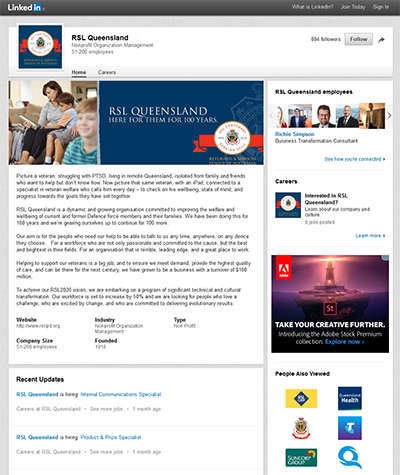 Capitalising on the opportunity to employ new technologies to more deeply engage with modern veterans of all age groups through online, mobile and social media channels, Mr Traini is well underway positioning the RSL as one of the leading providers of welfare, support and assistance and ensuring that the ever-challenging needs of the veteran and Defence community can be met well into the future.
Capitalising on the opportunity to employ new technologies to more deeply engage with modern veterans of all age groups through online, mobile and social media channels, Mr Traini is well underway positioning the RSL as one of the leading providers of welfare, support and assistance and ensuring that the ever-challenging needs of the veteran and Defence community can be met well into the future. 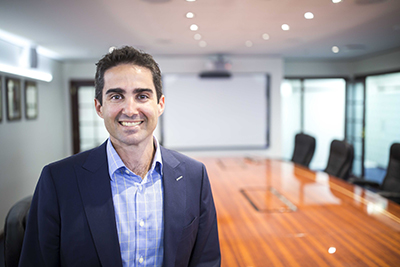 “It has been great to see teams adopt these more modern concepts and integrate new technologies into their day to ensure we build on our one team approach, regardless of where our people are physically located,” Mr Traini said.
“It has been great to see teams adopt these more modern concepts and integrate new technologies into their day to ensure we build on our one team approach, regardless of where our people are physically located,” Mr Traini said.